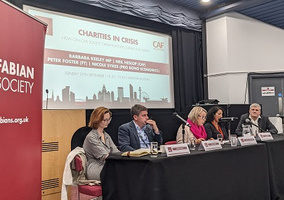The recently-appointed chief executive of Mind has said that large charities such as hers should change the way they operate to become an “anchor for the system”.
Speaking at a sector event last week, Sarah Hughes said that she was “really keen” to consider how “big charity” can change the way it delivers services alongside smaller organisations, and how it communicates externally.
Hughes also said that other sectors needed to recognise how productive charities already are and that civil society faced a challenge in explaining its purpose to the general public.
‘Big charity needs to shift’
“Big charity needs to shift. It needs to shift its focus in terms of being the only […] name in town to being an anchor for the system. So, Mind as an organisation is not the be all and end all of mental health,” Hughes said at the Law Family Commission’s report launch last week.
Speaking to Civil Society News afterwards, Hughes said she wanted to see large charities rethinking how they work with smaller organisations in terms of communications and delivery of services.
“It’s my intention to share the love in a way that I think big charity needs to, we can be an anchor, we can use our brand to accelerate, to amplify, to get that social change message across, but our duty is to the system and civil society as a whole,” she said in her speech.
“And so that's the bit that I am really keen to think about in my leadership over the coming years.”
Charity sector ‘already incredibly productive’
The Law Family Commission’s report included a call on funders and government to “invest in the social sector’s productivity” and for charities to work more closely with businesses.
Hughes noted she had not read the full report but said the charity sector was “already incredibly productive, on a level that I'm not entirely sure is always understood” by policymakers and businesses.
“We mustn't also forget that the charity sector is also made up of people who are incredibly professional, experienced, know how to run businesses, have managed incredibly small budgets achieved a huge amount of impact,” she said.
“So also, let's hold that in mind when we're talking about business and charity working together.”
Helping public understand civil society
Hughes, who was 14 days into her job when speaking at the event, also said that civil society had a challenge in communicating its purpose with the general public.
She said people were happier with charities providing “relief” than “reform”, despite the latter being needed.
“We’re in a moment of quite considerable challenge around the reform bit” so the sector must think about how to tackle that end of the spectrum “to help the public understand the nuance of civil society,” she said.
“And that, I think, is the challenge we haven't quite named, nor really found the solution to.”












